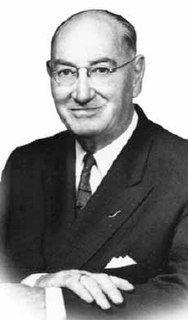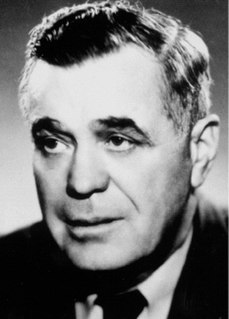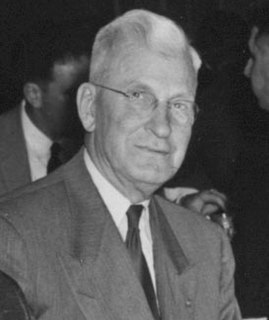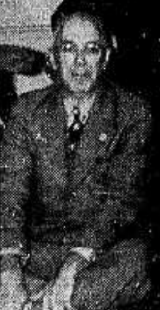
The 1935 Allan Cup was the senior ice hockey championship of the Canadian Amateur Hockey Association (CAHA) for the 1934–35 season. In the best-of-three final, the Halifax Wolverines defeated the Port Arthur Bearcats two games to none.

The 1935 Allan Cup was the senior ice hockey championship of the Canadian Amateur Hockey Association (CAHA) for the 1934–35 season. In the best-of-three final, the Halifax Wolverines defeated the Port Arthur Bearcats two games to none.
In the best-of-three final, the Halifax Wolverines defeated the Port Arthur Bearcats two games to none. [1]
The Halifax Wolverines were chosen to represent Canada in ice hockey at the 1936 Winter Olympics. [2] The Wolverines subsequently disbanded before the 1935–36 season. [3] The Port Arthur Bearcats were invited and promptly accepted. They had lost only one player from the previous season and were given the possibility of adding up to four players from the Wolverines. [4] Great Britain went on to capture the gold medal and Canada received the silver medal. The 1936 tournament was the first time in which Canada did not win the gold medal in ice hockey at the Olympic Games, which led to the CAHA and its president E. A. Gilroy being heavily scrutinized by media in Canada. [5]

The Allan Cup is the trophy awarded annually to the national senior amateur men's ice hockey champions of Canada. It was donated by Sir Montagu Allan of Ravenscrag, Montreal, and has been competed for since 1909. The current champions are the Lacombe Generals, who captured the 2019 Allan Cup in Lacombe, Alberta.

William Abraham Hewitt was a Canadian sports executive and journalist, also widely known as Billy Hewitt. He was secretary of the Ontario Hockey Association (OHA) from 1903 to 1966, and sports editor of the Toronto Daily Star from 1900 to 1931. He used the newspaper to promote the establishment of the Canadian Amateur Hockey Association (CAHA), served as its secretary-treasurer from 1915 to 1919, and was a trustee of the Allan Cup and the Memorial Cup. Hewitt served as the CAHA's registrar from 1921 to 1925, was the registrar-treasurer from 1925 to 1961, and implemented standard registration and transfer forms. He was a committee member to discuss professional-amateur agreements with the National Hockey League, and negotiated working agreements with amateur hockey governing bodies in the United States. He oversaw referees within the OHA, and negotiated to have common rules of play for amateur and professional leagues as chairman of the CAHA rules committee. After retiring from journalism, he was the managing-director of Maple Leaf Gardens from 1931 to 1948, and chairman of the committee to select the inaugural members of the Hockey Hall of Fame in 1945.

George Samuel Dudley was a Canadian ice hockey administrator. He joined the Ontario Hockey Association (OHA) executive in 1928, served as its president from 1934 to 1936, and as its treasurer from 1936 to 1960. He was elected to Canadian Amateur Hockey Association (CAHA) executive in 1936, served as its president from 1940 to 1942, as its secretary from 1945 to 1947, and as its secretary-manager from 1947 to 1960. He was secretary of the International Ice Hockey Association from 1945 to 1947, and was later vice-president of the International Ice Hockey Federation (IIHF) from 1957 to 1960. He was expected to become the next president of the IIHF before his death. He graduated from Osgoode Hall Law School in 1917 then practiced law for 43 years as the town solicitor for Midland, Ontario.
The Port Arthur Bearcats were a senior amateur ice hockey team based in Port Arthur, Ontario, Canada – now part of the city of Thunder Bay – from the early 1900s until 1970. Before settling on the nickname of Bearcats, the Port Arthur team played several seasons with unofficial generic names applied by fans and sportswriters, such as the Port Arthur Ports, Port Arthur Hockey Club, and the Port Arthur Seniors.

Allan Wilfrid Pickard was a Canadian ice hockey administrator, who served as president of the Canadian Amateur Hockey Association (CAHA) from 1947 to 1950. When Canada opted out of the 1947 Ice Hockey World Championships and decided not to participate in the 1948 Winter Olympics, Pickard felt that Canada was obliged to send a team due to its place as a top hockey nation, and nominated the Ottawa RCAF Flyers who won the gold medal for Canada and lived up to the requirements of the Olympic Oath as amateurs. Despite disagreement with the International Olympic Committee, he sought for the International Ice Hockey Federation to adopt the CAHA definition of amateur in the face of increasing difficulty in selecting the Canada men's national ice hockey team.

Frederick Page was a Canadian ice hockey administrator and ice hockey referee. He originated from Port Arthur, Ontario, where he played junior ice hockey, refereed locally and later at the Memorial Cup and Allan Cup competitions. He was a league executive in Fort William, then served as president of the Thunder Bay Amateur Hockey Association from 1958 to 1962. He was elected second vice president of the Canadian Amateur Hockey Association (CAHA) in 1962, and rose up the ranks to be its president from 1966 to 1968. Page wanted the CAHA to gain more control over its affairs, and become less dependent on the National Hockey League (NHL). Under his leadership, the NHL ended direct sponsorship of junior hockey teams. He was instrumental in negotiating the revised agreement for the NHL Amateur Draft in 1967, and later served as co-chairman of the resulting joint player development committee.
The 1936 Allan Cup the Canadian Senior ice hockey Grand Championship. The 1936 championship was the 29th time the Allan Cup had been awarded.

The Halifax Wolverines were an amateur men's senior ice hockey team based in Halifax, Nova Scotia. The team won the 1935 Allan Cup, and were nominated to represent Canada in ice hockey at the 1936 Winter Olympics but disbanded before playing in the Olympics.

The 1928 Allan Cup was the Canadian senior ice hockey championship for the 1927–28 season. The University of Manitoba won the Allan Cup, defeating the Montreal Victorias 2-1 on series.

The 1942 Allan Cup was the senior ice hockey championship of the Canadian Amateur Hockey Association for the 1941–42 season. The Ottawa RCAF Flyers defeated the Port Arthur Bearcats by three games to two to win the Allan Cup.

William George Hardy was a Canadian professor, writer, and ice hockey administrator. He lectured on the Classics at the University of Alberta from 1922 to 1964, and served as president of the Canadian Authors Association. He was an administrator of Canadian and international ice hockey, and served as president of the Alberta Amateur Hockey Association, the Canadian Amateur Hockey Association (CAHA), the International Ice Hockey Association, and the International Ice Hockey Federation.

William Alexander Fry was a Canadian sports administrator and newspaper publisher. Fry founded the Dunnville Chronicle in 1896, managed local hockey and baseball teams in the 1910s, then served as president of the Ontario Hockey Association (OHA) from 1922 to 1924. At the national level, he was president of the Canadian Amateur Hockey Association (CAHA) from 1928 to 1930, was a Canadian Olympic Committee member and British Empire Games committee member from 1927 to 1938, and served as president of the Amateur Athletic Union of Canada from 1934 to 1936.

Frank Forest Sargent was a Canadian sports executive in ice hockey and curling. He served as president of the Canadian Amateur Hockey Association (CAHA) from 1942 to 1945, and was president of the Dominion Curling Association (DCA) from 1965 to 1966. He was the first person to be elected to more than two terms as CAHA president, and the first to be president of two national amateur sporting associations in Canada.

Cecil Charles Duncan was a Canadian ice hockey administrator. He served as president of the Canadian Amateur Hockey Association (CAHA) from 1936 to 1938 and led reforms towards semi-professionalism in ice hockey in Canada. He served as chairman of the CAHA committee which proposed a new definition of amateur to eliminate what it called "shamateurism", in the wake of Canada's struggles in ice hockey at the 1936 Winter Olympics. He negotiated a series of agreements to protect the CAHA's interests, and to develop relationships with all other areas of the world where hockey was played. The agreements allowed the CAHA to become independent of the Amateur Athletic Union of Canada which wanted to keep the old definition of pure amateurism. Duncan's reforms also returned the CAHA to affluence after four years of deficits during the Great Depression and increased player registrations in Canada.

John Welch Hamilton was a Canadian sports executive. He served as president of the Canadian Amateur Hockey Association (CAHA) from 1930 to 1932, president of the Amateur Athletic Union of Canada from 1936 to 1938, and was a member of the Canadian Olympic Committee for 17 years. His leadership of the CAHA and the AAU of C coincided with efforts to maintain amateurism and combat growing professionalism in sport. He appointed a committee to establish better relations between the CAHA and professional leagues, and praised the players and teams for quality hockey and growth of the amateur game in Canada despite the competition. He favoured professionals in one sport playing as amateurs in another, and took charge of the AAU of C at a time when the CAHA, the Canadian Amateur Basketball Association, and the Canadian Amateur Lacrosse Association challenged the definition of amateur, and later broke away from the AAU of C which wanted to hold onto purist ideals of amateurism.

Edward Albert Gilroy was a Canadian ice hockey administrator. He served as president of the Manitoba Amateur Hockey Association (MAHA) from 1927 to 1934, and the Canadian Amateur Hockey Association (CAHA) from 1934 to 1936. In Manitoba, he sought to expand senior ice hockey and establish co-operation between teams and owners of the Winnipeg Amphitheatre on schedules and reducing travel costs. He wanted all players aged 21 and younger to remain in junior ice hockey and began to negotiate with professional teams to refrain from signing them to contracts. His seven years as leader of the MAHA was the longest tenure for a president at the time, during which he oversaw continued growth of the association and improvement of finances.

The Maritime Amateur Hockey Association (MAHA) was a governing body for amateur ice hockey in the Maritimes of Canada. It was a branch member of the Canadian Amateur Hockey Association from 1928 to 1974, with its jurisdiction including the provinces of New Brunswick, Nova Scotia and Prince Edward Island. The MAHA operated leagues for senior ice hockey which competed for the Allan Cup, and leagues for junior ice hockey which competed for the Memorial Cup. The New Brunswick Amateur Hockey Association separated from the MAHA in 1968, and the MAHA ceased to exist after the Nova Scotia Hockey Association and Prince Edward Island Hockey Association were established in 1974.

Frank Chapin Greenleaf was a Canadian sports administrator. He served as president of the Canadian Amateur Hockey Association and the Quebec Amateur Hockey Association, and was an executive in the Quebec branch of the Amateur Athletic Union of Canada. He presided over amateur hockey when the Canadian Amateur Hockey Association wanted to end the raiding of its rosters by foreign teams and to prevent a geographic shift in talent by imposing a residency rule for players. Greenleaf negotiated for a North American senior ice hockey championship that saw the Allan Cup winner play the amateur champion of the United States. He served as an executive member of multiple amateur hockey leagues in Montreal and was one of the founders of the Mount Royal Junior Hockey League.

Harry John Sterling was a Canadian ice hockey administrator. He was elected president of the Canadian Amateur Hockey Association (CAHA) in 1920, after serving as an Ontario Hockey Association executive and as president of the Thunder Bay Amateur Hockey Association. He declared that the CAHA would not tolerate the hockey "tourist" after becoming suspicious of players who changed their addresses to be on a new team. His investigation into registrations led to the suspension of a team from Saskatoon when it was discovered that players who won the gold medal representing Canada in ice hockey at the 1920 Summer Olympics were being paid for amateur hockey. His term as president resulted in the CAHA enacting stricter rules for registration and co-operation with the Amateur Athletic Union of Canada to investigate into all Canadian hockey players to maintain amateurism.

Frederick Paul Henry Marples was a Canadian sports executive in ice hockey and athletics. He was president of the Winnipeg Monarchs team which won Winnipeg Amateur Hockey League championships in 1914 and 1915, and the Allan Cup as senior ice hockey champions of Canada. His operation of a reserve team to support the Monarchs led to debates on player eligibility for the Allan Cup and calls for a national governing body of hockey. As the secretary-treasurer of the Winnipeg Amateur Hockey League, he helped establish both the Manitoba Amateur Hockey Association (MAHA) and the Canadian Amateur Hockey Association (CAHA) in 1914; then served as secretary-treasurer of the MAHA from 1914 to until 1934, and as secretary of the CAHA from 1926 to 1945. He sought to grow the game in rural regions of Manitoba, promote minor ice hockey as a source of future senior players, to keep players in junior ice hockey until age 21, and was against the exodus of amateur players to professional teams.